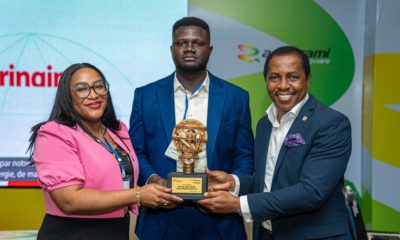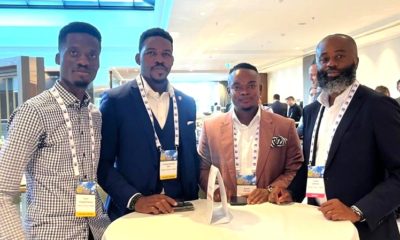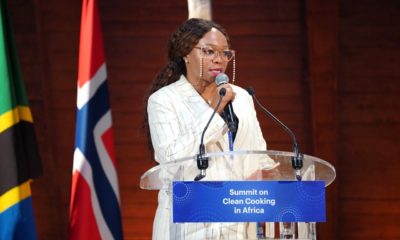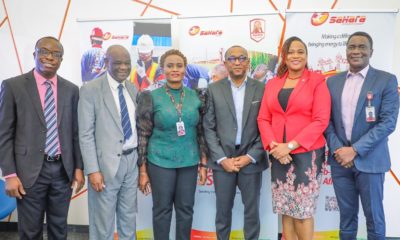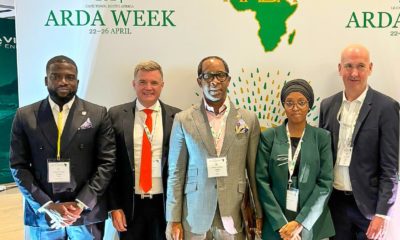Business
Sahara Group Foundation Unveils Global Extrapreneurship Model
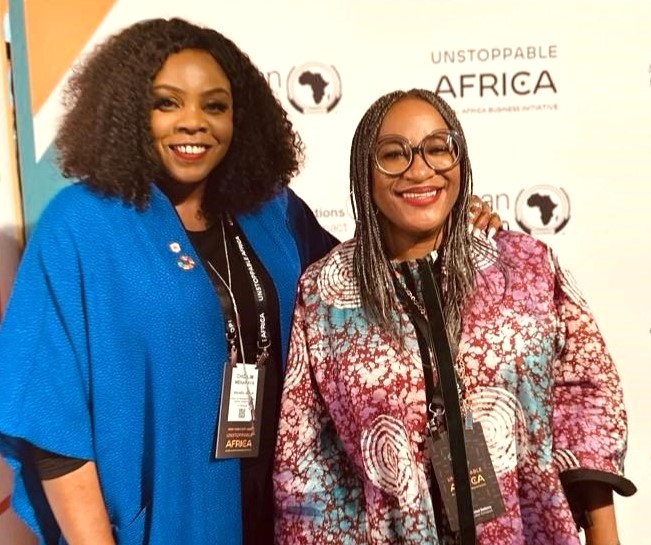
The social impact vehicle of energy conglomerate, Sahara Group, the Sahara Group Foundation (SGF), has unveiled its transformative Extrapreneurship strategy across Africa, Asia, Europe, and the Middle East.
Biztellers reports that the social impact strategy was aimed at driving integrated economic and community empowerment programs through collaborative partnerships and support for innovative as well as scalable business in the focus regions.
ALSO READ: Clean Cooking: Sahara Group Advocates Pan African Investment In LPG Infrastructure
Director, Governance and Sustainability, Sahara Group, Ejiro Gray, said in New York that the SGF had over the years implemented interventions focused on promoting the sustainable development goals, recording over two million beneficiaries across Sahara’s business locations.
According to Gray, the new strategy ensures the Foundation continues to actively drive the attainment of 11 of the 17 SDGs through “inclusive and progressive partnerships”.
“We are excited that with Extrapreneurship we can provide extra impetus to Africa’s march towards bringing sustainable development to African communities working through extrapreneurs, who through the support of Sahara Group Foundation can take their ideas and solutions to greater heights,” she said.
Similarly, Head of Programs at SGF, Chidilim Menakaya, expressed optimism that the EXTRApreneurship Strategy will promote economic growth in local communities through platforms that give entrepreneurs, social innovators, inventors, and small businesses access to honing their craft and scaling their businesses, “one community at a time”.
“Our Extrapreneurship model is designed to help Sahara Group Foundation play a key role as a bridge for economic empowerment and sustainable development by linking beneficiaries to sundry support platforms valued at 100 million USD, ultimately creating an ecosystem of collaborators working towards transforming Africa,” she said.
Menakaya noted that the SGF’s new model aims to prepare the entrepreneurial community for the future of work through the integration of artificial intelligence in the Extrapreneurship framework.
“These community entrepreneurs, or what we call EXTRApreneurs will not only drive forward thinking organizations but also empower ambidextrous individuals who are the backbone of the SME sector, a pivotal force for driving economic growth,” she added.
She revealed that the Extrapreneurship program would identify and support innovators, entrepreneurs, inventors and researchers who have developed proven sustainable products or solutions to everyday problems using locally available resources.
This will be done through financial, advisory and investment support as well as building business hubs within the community leveraging the business niche area of each community.
The SGF, she noted, will continue to drive its recycling initiative, an environmental sustainability and economic empowerment initiative that converts waste to wealth.
Business
Trade Tensions Hit Nokia As Q1 Ends In €68M Loss
Nokia has reported a net loss of €68 million for the first quarter of 2025, a sharp decline from the €438 million profit recorded during the same period last year.
The Finnish telecoms equipment maker attributed the downturn to global trade disruptions and recently imposed tariffs by the United States.
The company’s net sales dropped slightly to €4.4 billion, down by one percent year-on-year.
READ ALSO: Trade War: China Strikes Back Wth 125% Tariffs On U.S. Goods
Tariff-related challenges were highlighted by Nokia’s President and CEO, Justin Hotard, who acknowledged the broader economic pressures affecting the industry.
“We are not immune to the rapidly evolving global trade landscape,” Hotard stated. “However, based on early customer feedback, I believe our markets should prove to be relatively resilient.”
He also noted the potential short-term financial impact, saying, “Based on what we see today, we currently expect a EUR 20 to 30 million impact on our comparable operating profit in the second quarter from the current tariffs.”
Earlier this month, U.S. President Donald Trump introduced a 10 percent tariff on global imports, while pausing plans for steeper duties, including a proposed 20 percent levy on products from the European Union.
Despite the quarterly setback, Nokia expressed confidence in its growth prospects.
The company is looking to its Network Infrastructure, Cloud and Network Services, and Mobile Networks divisions to drive sales in the year ahead.
In a sign of continued momentum in the mobile segment, Nokia also announced on Thursday that it had extended its contract with T-Mobile US.
The company said it is continuing “to see positive signs of stabilization” in Mobile Networks.
Business
Marketers In Anguish, As Dangote, NNPC Ltd War Drag Price To N880/litre
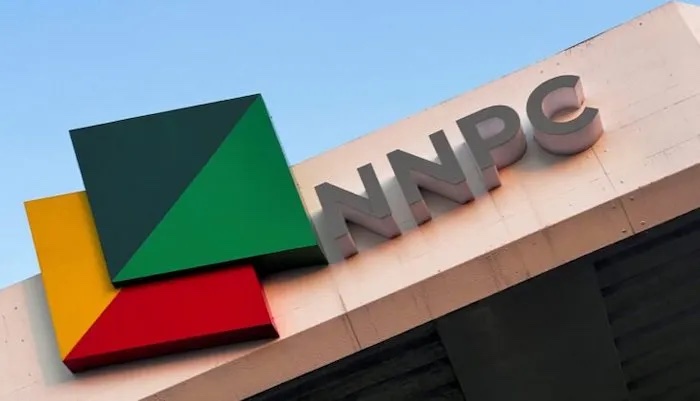
The pull of market forces which moved the hands of the Nigerian National Petroleum Company Limited (NNPC Ltd) to reduce the price of Premium Motor Spirit (petrol) to N880 per litre in Lagos and N935 in Abuja appears to be a source of torture to independent markets.
Biztellers reports that the latest price review on Easter Monday saw NNPC retail outlets in Lagos drop from N925 to N880, while those in Abuja adjusted from N950 to N935.
The NNPC Ltd’s price reduction came barely a week after the Dangote Refinery lowered its ex-depot price from N865 to N835 per litre.
ALSO READ: BREAKING: Again, Dangote Cuts Petrol Price To N835 per Litre
In addition, the $20bn refinery also directed its partners like MRS, Heyden, and Ardova to sell a litre of petrol at the rate of N890 instead of N920 in Lagos, N900 in the South West, N910 in the South-South, and N920 in the North East.
Consumers can smile because with the reaction, the NNPC Ltd’s new price in Lagos is N10 lower than what the Dangote Refinery is selling at, which might lead to another reaction, as the price war between the two companies.
Though some NNPC Ltd’s retail outlets were observed selling at the old rate in Lagos, it was gathered that they were given the liberty to exhaust old stock before adjusting to the new prices.
Market sources are of the view that the current price war was ignited by the Federal Government’s implementation of the Naira-for-crude policy.
Business
Gold Prices Hit Historic $3,500 Amid Trump Tariffs, Fed Tensions
Gold soared to a record high of $3,500 an ounce on Tuesday, as mounting fears over a potential U.S. recession and escalating tensions between President Donald Trump and the Federal Reserve drove investors toward the traditional safe-haven asset.
The precious metal briefly touched an all-time high of $3,500.10 an ounce before retreating slightly to trade at $3,467.87.
READ ALSO: JUST IN: Vatican Discloses Cause Of Pope Francis’ Death
The rally marks the latest in a string of record-breaking gains for gold, fueled by a weakening U.S. dollar, sharp declines across global stock markets, and growing concerns over the health of the world economy.
Market sentiment took another hit this week after President Trump ramped up his trade war with China, slapping fresh tariffs on the world’s second-largest economy and intensifying fears of prolonged economic disruption.
Gold has surged more than 30 percent since the start of the year as investors seek refuge from mounting market volatility.
“The rally reflects ongoing recession fears in the U.S. economy and heightened political tensions, especially as President Donald Trump continues to attack Federal Reserve Chair Jerome Powell,” said Rania Gule, senior market analyst at trading group XS.com.
Concerns about the Fed’s independence were further stoked Monday, when Trump publicly lashed out at Powell on social media, branding him a “major loser” for not cutting interest rates — a move the president has repeatedly demanded.
The sharp criticism follows Trump’s recent suggestion that he might attempt to remove Powell from his post.

